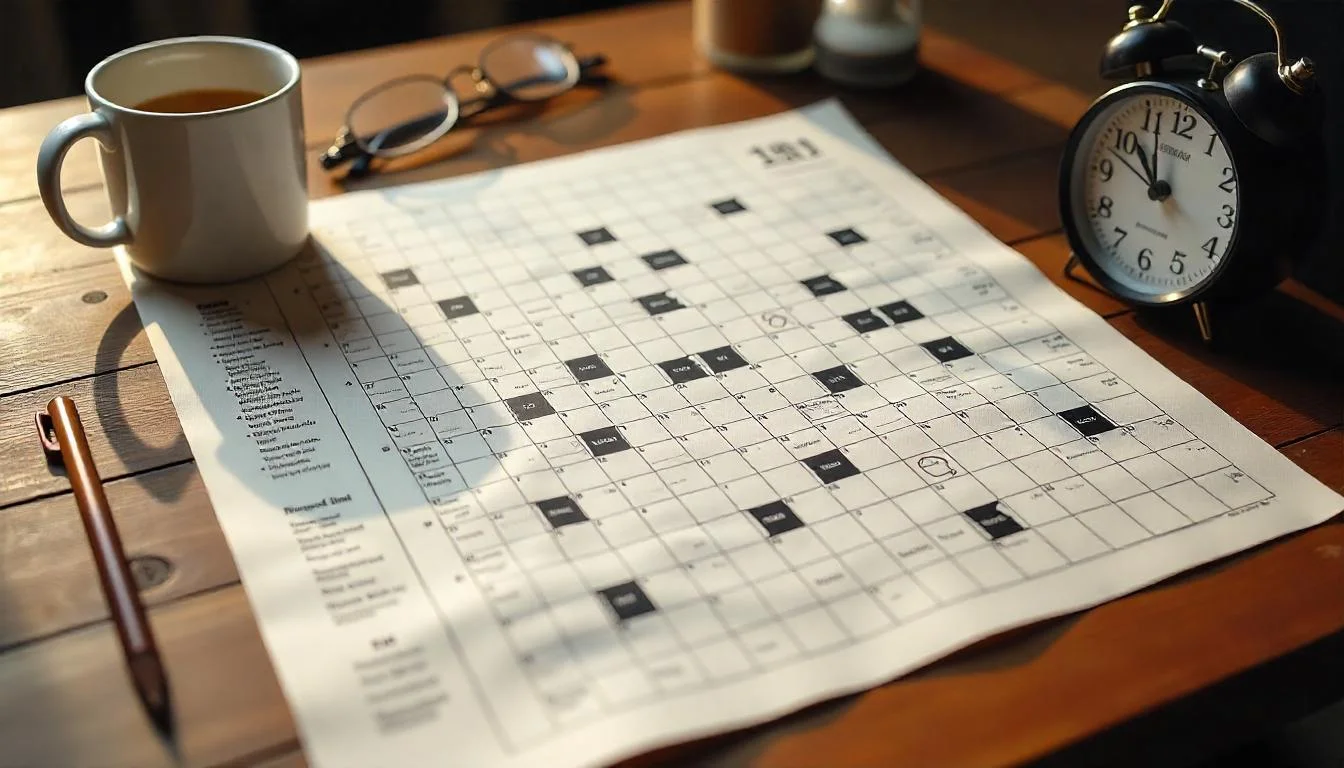Sunday mornings hold a special ritual for crossword enthusiasts across America. While others reach for their coffee and newspaper comics, dedicated solvers turn to the back pages where the New York Times Sunday crossword waits—a sprawling 21×21 grid that can humble even seasoned puzzlers.
The Sunday NYT crossword isn’t just bigger than its weekday counterparts; it’s an entirely different beast. Where Monday through Saturday puzzles follow a predictable difficulty curve, Sunday puzzles throw convention out the window. They’re designed to challenge, entertain, and occasionally frustrate solvers who think they’ve mastered the art of crossword completion.
What makes these XL puzzles so captivating? Beyond their impressive size, Sunday crosswords feature intricate themes, wordplay that borders on genius, and clues that demand both broad knowledge and creative thinking. They’re puzzles that can consume an entire lazy afternoon—and leave you feeling either triumphant or thoroughly defeated.
The Anatomy of a Sunday NYT Crossword
Sunday crosswords operate by different rules than their weekday siblings. The expanded 21×21 grid contains roughly 140 answers compared to the typical 78 found in daily puzzles. This extra real estate allows constructors to craft elaborate themes that would be impossible to execute in smaller grids.
Most Sunday puzzles revolve around a central theme that connects multiple long answers throughout the grid. These themes range from straightforward wordplay to complex conceptual connections that only become clear once you’ve filled in several theme entries. The theme often includes a “revealer” clue that explains the puzzle’s central conceit, though some constructors prefer to let solvers discover the pattern independently.
The difficulty level of Sunday puzzles typically falls somewhere between Wednesday and Thursday on the NYT’s weekly difficulty scale. However, the sheer size can make them feel more challenging than a Thursday puzzle, especially when solvers get stuck in one corner with nowhere to retreat.
Constructor Will Shortz, the longtime NYT crossword editor, has maintained strict standards for Sunday puzzles since taking over in 1993. Each puzzle must have rotational symmetry, with no more than 78 words that appear fewer than three letters long, and themes that feel fresh and engaging rather than recycled from previous puzzles.
Why Sunday Puzzles Feel Different
The extended solving time required for Sunday crosswords creates a unique psychological experience. Unlike weekday puzzles that many solvers complete during their morning commute, Sunday puzzles demand patience and sustained focus. This extended engagement changes how your brain approaches the solving process.
Sunday constructors have more space to include longer phrases and complete sentences as answers. While a Tuesday puzzle might have “ERA” or “AGE” as a three-letter answer, Sunday puzzles can accommodate full phrases like “WHAT’S THE BIG IDEA” or “THAT’S WHAT I’M TALKING ABOUT.” These longer entries often feel more satisfying to uncover but require different solving strategies.
The themes in Sunday puzzles also tend to be more ambitious. A weekday theme might connect four or five related answers, but Sunday themes can incorporate eight, ten, or even twelve themed entries. This complexity means that understanding the theme becomes crucial to completing the puzzle successfully.
Wordplay reaches new heights in Sunday editions. Constructors use the extra space to create puns, anagrams, and letter manipulations that would be impossible in smaller grids. Some Sunday puzzles ask solvers to perform mental gymnastics—adding letters, removing letters, or even reading answers backwards to understand the theme.
Strategies for Conquering XL Crosswords
Successful Sunday solvers often develop different approaches than they use for weekday puzzles. The sheer size can be overwhelming, making systematic solving strategies more important than brute-force tactics.
Start with the theme entries, which are typically the longest answers in the puzzle. These usually include several 15-letter entries and multiple 10-12 letter phrases. Theme entries often have more straightforward clues than their surrounding fill, making them excellent launching points for tackling different sections of the grid.
Work in sections rather than trying to solve the entire puzzle linearly. Many experienced solvers divide the grid into quadrants, completing one corner before moving to another. This approach prevents you from getting stuck in one problematic area while neglecting easier sections elsewhere.
Pay attention to the puzzle’s title, which often provides crucial hints about the theme. Sunday puzzle titles are rarely arbitrary—they usually contain wordplay or direct references to the theme that become clear once you’ve identified the pattern.
Don’t ignore the short fill words. While Sunday puzzles allow for longer, more interesting answers, they still contain plenty of three and four-letter words. These shorter entries often use common crossword vocabulary that experienced solvers recognize immediately, providing footholds in difficult sections.
The Psychology of Sunday Solving
Sunday crosswords create a different mental state than rapid-fire weekday solving. The extended time commitment transforms puzzle-solving from a quick mental exercise into a meditative practice. Many solvers report entering a flow state during longer solving sessions, where time seems to disappear and focus narrows to the grid in front of them.
This extended engagement also means that Sunday puzzles can be more emotionally challenging. Getting stuck on a weekday puzzle might cause brief frustration, but getting stuck on a Sunday puzzle after investing an hour or more can feel genuinely defeating. The psychological investment makes eventual success more rewarding but temporary setbacks more discouraging.
The social aspect of Sunday solving differs as well. Many households treat the Sunday crossword as a collaborative activity, with family members or friends working together to complete the puzzle. This collaborative approach changes the solving dynamic from individual achievement to group problem-solving.
Research suggests that the sustained mental effort required for Sunday puzzles provides different cognitive benefits than shorter puzzles. The extended focus period may improve concentration and working memory more effectively than brief daily solving sessions.
Common Sunday Puzzle Themes
Sunday crossword themes fall into several recognizable categories, though the best constructors find fresh approaches to familiar concepts. Knowing these common theme types can help solvers identify patterns more quickly.
Letter manipulation themes are particularly popular. These might involve adding a letter to common phrases (“BATTING AVERAGE” becomes “BATTING AVERAGES”), removing letters, or changing one letter throughout. The revealer clue typically explains what manipulation is being performed.
Wordplay themes exploit double meanings, homophones, or puns. These puzzles might take common phrases and reinterpret them literally, or find phrases that work on multiple levels simultaneously. The humor in these themes often provides as much satisfaction as solving them.
Category themes group related items in unexpected ways. Rather than obvious connections like “types of birds,” Sunday themes might connect items through wordplay, shared letters, or conceptual relationships that aren’t immediately apparent.
Meta themes reference crossword solving itself, the puzzle’s construction, or even the solver’s experience. These self-referential puzzles can be particularly satisfying for crossword enthusiasts who appreciate the constructor’s craft.
The Community of Sunday Solvers
Sunday crosswords have fostered a dedicated community of enthusiasts who share strategies, celebrate successes, and commiserate over particularly challenging puzzles. Online forums buzz with discussion of each Sunday’s puzzle, with solvers sharing their solving times, favorite clues, and interpretations of tricky themes.
This community aspect extends beyond casual discussion. Crossword tournaments often feature Sunday-sized puzzles as their ultimate challenges, and many local crossword clubs organize around weekly solving sessions focused on the Sunday puzzle.
The shared experience of struggling with the same challenging clues creates bonds among solvers. Unlike other hobbies where skill levels can prevent meaningful interaction, crossword solving allows beginners and experts to tackle the same puzzle, even if their solving times differ dramatically.
Social media has amplified this community feeling. Solvers share screenshots of completed grids, discuss particularly clever clues, and offer hints to those who get stuck. The Sunday puzzle often trends on crossword-focused social media accounts, creating a weekly ritual of shared solving.
When Sunday Puzzles Go Wrong
Not every Sunday puzzle succeeds. The additional complexity and size create more opportunities for constructors to lose focus or for themes to become convoluted. Failed Sunday puzzles often suffer from themes that are too complicated to understand or execute, fill that becomes overly compromised by the ambitious theme, or solving experiences that feel more like work than entertainment.
Overly complex themes can alienate solvers who complete the puzzle without ever understanding its central conceit. While some ambiguity can be engaging, themes that remain incomprehensible even after completion feel unsatisfying rather than challenging.
The pressure to fill a 21×21 grid sometimes forces constructors to include obscure words or proper names that feel unfair to most solvers. While some challenging vocabulary is expected, Sunday puzzles that rely too heavily on esoteric knowledge can feel exclusionary rather than challenging.
Uneven difficulty can also plague Sunday puzzles. Sections that are significantly easier or harder than the rest create solving experiences that feel choppy and inconsistent. The best Sunday puzzles maintain relatively consistent challenge levels throughout the grid.
Making Sunday Crosswords Part of Your Routine
For solvers ready to tackle Sunday puzzles regularly, establishing sustainable solving habits becomes important. Unlike weekday puzzles that can be completed in short bursts, Sunday puzzles require dedicated time blocks and the right environment.
Many successful Sunday solvers establish ritual around their weekly puzzle session. This might involve a specific location, particular beverages, or even background music that helps maintain focus during extended solving sessions. The ritual aspect transforms puzzle-solving from a casual activity into a meaningful weekly practice.
Don’t expect to complete every Sunday puzzle, especially when starting out. The size and complexity mean that even experienced solvers occasionally encounter puzzles that defeat them. Accepting this reality reduces frustration and allows you to enjoy the solving process regardless of whether you fill every square.
Consider using online solving tools that allow you to save progress and return to partially completed puzzles. This flexibility means you can tackle Sunday puzzles over multiple sessions rather than feeling pressured to complete them in one sitting.
Track your progress over time rather than focusing on individual puzzle outcomes. Many solvers find that their Sunday completion rate improves gradually as they become familiar with common theme types and constructor styles.
The Evolution of Sunday Crosswords
Sunday crosswords have evolved significantly since their early days. Modern puzzles feature more diverse constructors, broader cultural references, and increasingly creative themes that would have been impossible under earlier editorial standards.
The digital age has transformed how people interact with Sunday puzzles. While many traditionalists prefer solving on paper, online solving tools offer features like error-checking, hint systems, and the ability to collaborate with distant friends or family members.
Constructor diversity has brought fresh perspectives to Sunday themes. Puzzles now reference contemporary culture, internet phenomena, and experiences that reflect America’s changing demographics. This evolution keeps Sunday puzzles feeling current rather than stuck in the past.
Technical improvements in puzzle construction software have enabled more sophisticated themes and cleaner fill. Modern constructors can experiment with complex constraints and patterns that would have been practically impossible to execute using older methods.
Beyond the New York Times
While the NYT Sunday crossword remains the most prominent, other publications offer their own Sunday-sized challenges. The Los Angeles Times, Wall Street Journal, and various independent constructors create Sunday puzzles with their own editorial voices and solving communities.
Each publication brings different strengths to Sunday puzzle construction. Some emphasize wordplay, others focus on current events, and still others prioritize accessibility for newer solvers. Exploring different Sunday puzzle sources can help solvers find styles that match their preferences and skill levels.
Independent constructors often push boundaries that traditional publications might avoid. Their Sunday puzzles might experiment with unconventional grid shapes, unusual themes, or solving mechanics that challenge expectations about what crosswords can be.
Your Sunday Puzzle Journey Awaits
The world of XL NYT crosswords offers intellectual challenges that can last a lifetime. These puzzles reward persistence, creativity, and broad knowledge while providing weekly opportunities to engage with clever wordplay and ingenious themes.
Start with recent Sunday puzzles rather than diving into archived classics. Contemporary puzzles tend to use more familiar vocabulary and cultural references that will feel accessible to new solvers. As your confidence grows, you can explore the extensive archives of past Sunday puzzles.
Consider joining online communities where Sunday solvers share strategies and discuss weekly puzzles. The collective wisdom of experienced solvers can help you develop techniques and perspectives that would take years to discover independently.
Remember that Sunday crosswords are meant to be enjoyable challenges rather than exercises in frustration. If you find yourself getting stuck regularly, don’t hesitate to use hint resources or collaborate with other solvers. The goal is engagement and satisfaction, not solo suffering.
Whether you complete your first Sunday puzzle in thirty minutes or three hours, you’ll join a community of solvers who appreciate the unique satisfaction these XL challenges provide. Sunday crosswords offer weekly opportunities to exercise your mind, learn new things, and experience the particular joy that comes from filling that final square in a 21×21 grid.

















